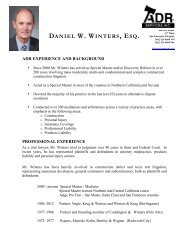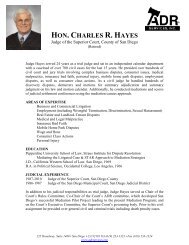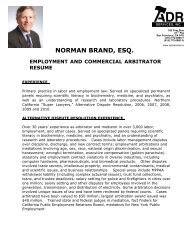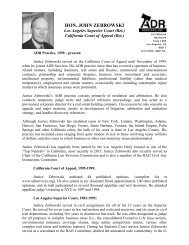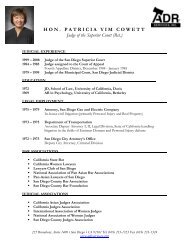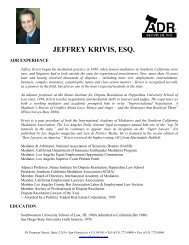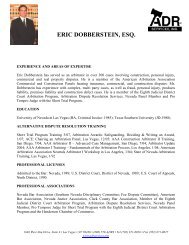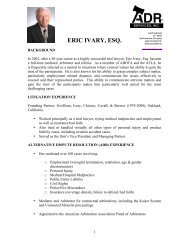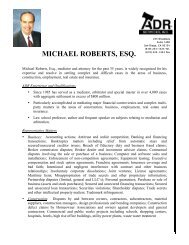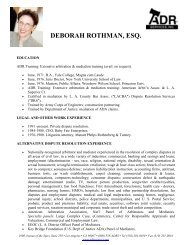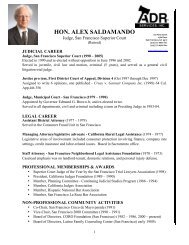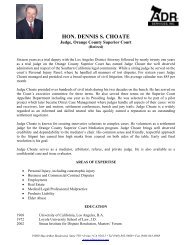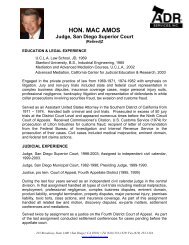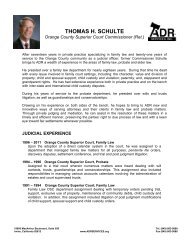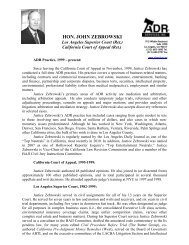Los Angeles Lawyer Article - ADR Services, Inc.
Los Angeles Lawyer Article - ADR Services, Inc.
Los Angeles Lawyer Article - ADR Services, Inc.
You also want an ePaper? Increase the reach of your titles
YUMPU automatically turns print PDFs into web optimized ePapers that Google loves.
MCLE ARTICLE AND SELF-ASSESSMENT TEST<br />
By reading this article and answering the accompanying test questions, you can earn one MCLE credit.<br />
To apply for credit, please follow the instructions on the test answer sheet on page 19.<br />
by Judge Michael D. Marcus (ret.)<br />
What Happens in<br />
MEDIATION...<br />
Courts have carved out only very rare<br />
exceptions to mediation confidentiality<br />
CONFIDENTIALITY dominates the mediation process in California.<br />
With rare exceptions, all writings and statements prepared for and<br />
made at mediation cannot be divulged. Confidentiality is a cornerstone<br />
of mediation because it enables all participants to discuss<br />
openly the legal and factual elements of their cases without consequence<br />
or detriment. 1<br />
Along with the clear advantages of confidentiality, however, are<br />
its less obvious and sometimes criticized byproducts, including the protection<br />
of misconduct and incompetence. Indeed, while an attorney<br />
is constrained from misleading a judicial officer 2 or opposing attorney,<br />
3 misrepresentations to neutrals or other mediation participants<br />
are not subject to either sanctions or discipline. 4 The interpretation<br />
by courts of the scope of mediation confidentiality thus carries high<br />
stakes for all involved. As a result, practitioners should be aware of<br />
recent decisions by the California Supreme Court and a Ninth Circuit<br />
Court of Appeals case to fully grasp the current breadth of confidentiality<br />
applicable to mediation.<br />
Mediation confidentiality in California’s state courts derives from<br />
the California Evidence Code, 5 which states that every communication,<br />
whether oral or in writing, that was “made for the purpose of,<br />
in the course of, or pursuant to mediation” is confidential and not<br />
admissible at any subsequent proceeding or subject to discovery. 6 The<br />
source of mediation confidentiality in California’s federal courts is<br />
based on local rules as well as case law and is thus more nuanced. 7<br />
The California Supreme Court’s 2001 decision in Foxgate<br />
Homeowners’ Association, <strong>Inc</strong>. v. Bramalea California, <strong>Inc</strong>., is the<br />
natural starting point for an analysis of mediation confidentiality in<br />
California state courts. In Foxgate, the supreme court held that pursuant<br />
to Evidence Code Sections 1119 and 1121, a mediator may not<br />
report attorney misconduct or bad faith to a jurist with the underlying<br />
case on his or her calendar. According to the Foxgate court,<br />
“Neither a mediator nor a party may reveal communications made<br />
during mediation.” Moreover, Section 1121 prohibits mediators<br />
“and anyone else from submitting a document that reveal[s] communications<br />
during mediation and [bars] the court from considering<br />
them.” 8 The opinion further held that:<br />
Although a party may report obstructive conduct to the court,<br />
Michael D. Marcus, a retired judge of the State Bar Court, is a mediator,<br />
arbitrator, and discovery referee with <strong>ADR</strong> <strong>Services</strong>, <strong>Inc</strong>. He specializes in the<br />
resolution of employment, commercial/business, personal injury, real property,<br />
legal malpractice, and medical malpractice cases.<br />
<strong>Los</strong> <strong>Angeles</strong> <strong>Lawyer</strong> December 2011 17



